 Petzlover
Petzlover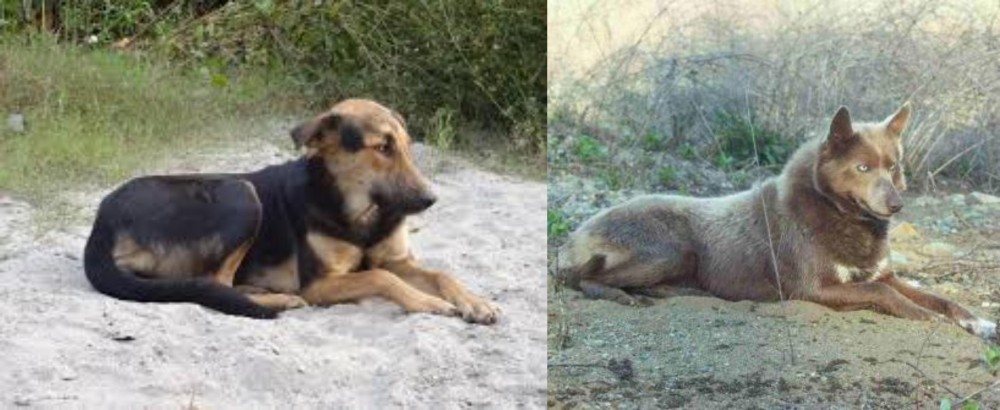 Indian Pariah Dog is originated from India but Tahltan Bear Dog is originated from Canada. Indian Pariah Dog may grow 21 cm / 9 inches higher than Tahltan Bear Dog. Indian Pariah Dog may weigh 21 kg / 47 pounds more than Tahltan Bear Dog. Both Indian Pariah Dog and Tahltan Bear Dog has same life span. Both Indian Pariah Dog and Tahltan Bear Dog has almost same litter size. Both Indian Pariah Dog and Tahltan Bear Dog requires Low Maintenance.
Indian Pariah Dog is originated from India but Tahltan Bear Dog is originated from Canada. Indian Pariah Dog may grow 21 cm / 9 inches higher than Tahltan Bear Dog. Indian Pariah Dog may weigh 21 kg / 47 pounds more than Tahltan Bear Dog. Both Indian Pariah Dog and Tahltan Bear Dog has same life span. Both Indian Pariah Dog and Tahltan Bear Dog has almost same litter size. Both Indian Pariah Dog and Tahltan Bear Dog requires Low Maintenance.
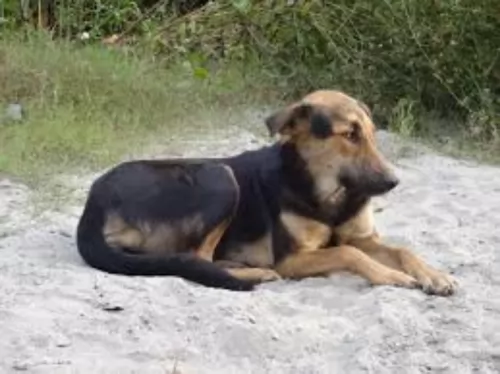 The Indian pariah, known also as the Indi-dog or In-dog, is an ancient dog breed common throughout India as well as Bangladesh.
The Indian pariah, known also as the Indi-dog or In-dog, is an ancient dog breed common throughout India as well as Bangladesh.
A breed standard does exist for the dog with the Indian Kennel Club and the dog has also been recognized by the Primitive and Aboriginal Dog Society.
A great dog enthusiast, Indian environmentalist, M Krishnan, has written about this ancient dog breed, telling about its wonderful temperament and its hardy constitution.
 The primitive Tahltan Bear Dog comes from Canada. The dog was developed by the Tahltan people to hunt bears, so you can imagine he was a strong, brave dog.
The primitive Tahltan Bear Dog comes from Canada. The dog was developed by the Tahltan people to hunt bears, so you can imagine he was a strong, brave dog.
They also had fox-like yaps that confused bears until the hunter could come and kill the bear. These dogs are descended from pariah-type dogs with their diet being birds and fish.
It was in 1988 that the Canadian Post Office honoured the Tahltan Bear Dog by having a picture of it appearing on a stamp.
Some people claim that after the 1960s there are no longer any living descendants while others say that breeding projects were established and that there are still a few of these dogs around today. There are records on the other hand that claim the dog became extinct in the 1970s.
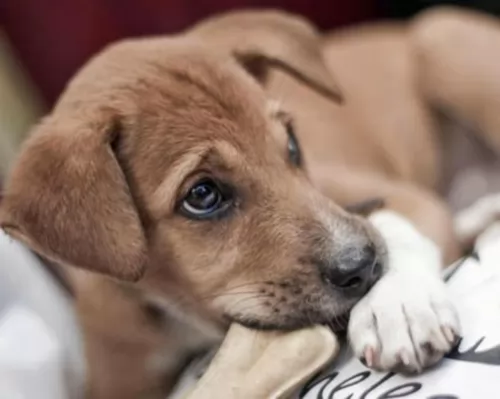 The Indian Pariah dog is a medium sized, lanky looking dog with the males and females standing at 46cm to 64cm in height and weighing roughly between 15 to 30kg.
The Indian Pariah dog is a medium sized, lanky looking dog with the males and females standing at 46cm to 64cm in height and weighing roughly between 15 to 30kg.
These dogs aren't big eaters so they tend to be lean and muscular. This is a double coated dog with the hair being coarse and fawn in colour or reddish brown.
He has fairly large, erect ears and brown eyes. He has a long tail which is held down but when he is excited it is held high and over the back, curling at the tip. There is sometimes white around the face and chest.
The Pariah dog is a social dog but he is somewhat timid, even though they make excellent watch dogs, being territorial around their human family. Being territorial, he can have an aggressive side to him so it is wise to have him trained and socialized as then he is obedient and capable of getting on well with children in the home.
These dogs are also very intelligent and therefore easily trained. He is an active dog and likes to be kept busy, wanting to be participating in the activities of his human family.
 Not like a bear, but more foxy in appearance or even more like a husky, the Tahltan Bear dog is medium sized, standing at between 36 – 43cm in height and weighing between 6 – 9 kg.
Not like a bear, but more foxy in appearance or even more like a husky, the Tahltan Bear dog is medium sized, standing at between 36 – 43cm in height and weighing between 6 – 9 kg.
It is believed that they were similar to spitz and pariah type dogs, and were athletic. The short to medium length coat of the dog was mainly black or brown with some white.
He had fairly large pointed, erect ears and also a fairly pointed muzzle. The tail was interesting and was short and furry and always carried erect.
The Tahltan Bear Dog is fearless, not being deterred when meeting large bear. It's why the dog has been valued by hunters – their bravery and fearlessness.
They’re great family dogs too and will get on well with children. He is intelligent and easy to train if you want to give him training and socialization.
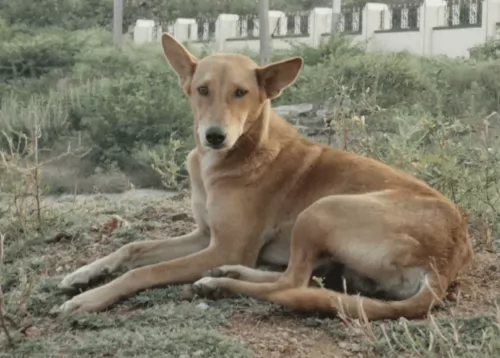 The Indian Pariah dog is just an ordinary dog looking to be a superb companion for you. These are dogs with no airs and graces and in fact they have lots of positive attributes about them.
The Indian Pariah dog is just an ordinary dog looking to be a superb companion for you. These are dogs with no airs and graces and in fact they have lots of positive attributes about them.
They are just your ordinary, social dogs who are able to form strong, loyal friendships with their human owners. He is a faithful dog breed and he has had a long association with humans dating back to thousands of years. He is healthy and cheerful and he is just waiting for you to give him a chance so that he can show you what a cheerful, playful, devoted, wonderful friend he can be to you too.
 Because some claim that this dog is extinct, there are only a few accounts of what he is actually like.
Because some claim that this dog is extinct, there are only a few accounts of what he is actually like.
Even though they were hunting dogs, they were devoted pets and companions of the people of the Yukon.
If these dogs are still to be found today, you will find them to be easy going, protective, loyal, intelligent, playful, alert, watchful and energetic. Just don’t allow them to get too hot as they prefer cooler climates.
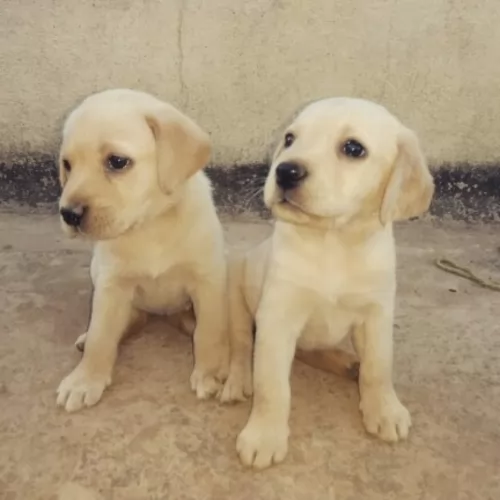 This is a dog which can live to between 13 and 15 years of age when he is treated well.
This is a dog which can live to between 13 and 15 years of age when he is treated well.
These Indian Pariahs are a natural dog breed, and to this end they are free of genetic health concerns such as hip dysplasia which is a very common ailment with nearly all dogs.
Remember that every dog stands a good chance of picking up some life-threatening illnesses if not vaccinated against them. Some of these diseases to be concerned about are canine distemper and parvo-virus. Rabies, kennel cough and parasites such as fleas and ticks can also pose a real danger to your pet.
The Pariah has been around for a very long time and today he is a robust, low maintenance pet that isn't going to cost you a lot of money .
 Healthy dogs are unlikely to pick up any of the many common dog illnesses there are. There are many – cancer, diabetes, bloat, hip dysplasia, ear infections, dental disease and many more.
Healthy dogs are unlikely to pick up any of the many common dog illnesses there are. There are many – cancer, diabetes, bloat, hip dysplasia, ear infections, dental disease and many more.
This is a contagious and infectious disease known as canine tracheobronchitis and which is transmitted through the air. Treatment is usually administered as a nasal spray, but your dog will need to get to the vet because of his dry, honking cough and lack of appetite.
This is a viral disease which in most instances is fatal. It is mostly transmitted when an animal that carries the disease bites the dog. Your dog develops behavior which is totally uncharacteristic of him. He'll also froth at the mouth and become aggressive. Death is nearly always guaranteed.
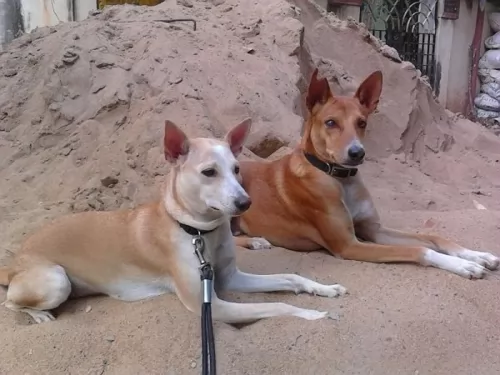 This is a low maintenance dog who also happens to shed little. A brush once or twice a week will be sufficient and it will keep the fur shiny and healthy.
This is a low maintenance dog who also happens to shed little. A brush once or twice a week will be sufficient and it will keep the fur shiny and healthy.
Your puppy will need to be vaccinated at 6 weeks of age. There are some veterinary clinics in India that offer free vaccine shots. Your puppy will be dewormed too. Make sure he has a nice dry, warm place to sleep, and for during the day, ensure that there is a shady spot for him too.
It's always a good idea to try and feed your puppy the best food there is. If you visit a veterinary clinic, find out what the most appropriate food would be for your puppy and how often you should feed him during the day.
If you feed your adult Indian Pariah dog kibble and you're able to, try and add in some home-made food too such as cooked chicken or rice. Some raw meat added in from time to time will also do your dog the world of good. Make sure there is always a bowl of cool, clean water standing by.
 This double coated hunting dog’s thick coarse coat will require brushing at least twice a week to free the dog of loose hair. He is regarded as a low mainenance dog.
This double coated hunting dog’s thick coarse coat will require brushing at least twice a week to free the dog of loose hair. He is regarded as a low mainenance dog.
During brushing, you would check inside his ears and make sure there are no signs of redness. Eyes of the dog should be bright, eager and free of discharge.Always keep the nails of the dog trimmed.
If you keep your pet outside for any lengths of time it is imperative that this dog has shade to lie down in as he doesn’t do well in too much heat.
Because he is a hunting dog, he is used to being outdoors and being active. He wont be content to lie around inactive for too long. He’ll want at least a walk every day and some ball games.
A pet dog can’t choose his own food so they depend on us to make the right choices for them. It’s always convenient to have a packet of commercially manufactured dog food available, but who knows if this dog, which some claim is extinct, ever ate commercially manufactured food.
If he did, you would want to mix it every now and again with home made food - boiled chicken, sweet potatoes, brown rice or pasta, carrots and spinach. This food could be chopped up and added to the dog’s kibble.